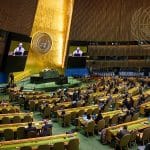According to the most recent data, Serbia’s COVID-19 vaccination program, initially using a Chinese vaccine and symbolic quantities from third country suppliers, now leads the Southeastern European region, putting it significantly ahead of even EU member states located there. The programs in non-EU member states in the region have been slow to start due to minimal vaccine deliveries from western suppliers and the World Health Organization (WHO), creating new friction between Europe’s haves and have nots; Serbia’s decision to utilize Chinese and soon Russian supplies places it far ahead of all its neighbors.
EU Promises Support
With every passing day, the earlier promises of EU support and relief funding are increasingly seen as worthless “communications” exercises; the hope is that once global vaccine production is ramped up further, the region’s pent-up demand can be addressed, but this equilibrium will not be reached until the second half of 2021 if even then.
Back in mid-January European Commission Vice-President Maros Sefcovic had informed EU member states that the Commission had been able to secure vaccine supplies and would be able to share them with its Western Balkan partners, without providing specifics. He noted the Commission is coordinating with member states who planned to donate vaccines from the joint EU procurement, and also via the WHO’s COVAX initiative, itself extremely slow to launch but currently planning to dispatch initial shipments of the AstraZeneca vaccine to the poorest countries later in February.
Serbia in the lead
The statistics now available show that Serbia has administered over 640,000 Covid inoculations to its population, or 9.2 doses per 100 people. Serbia received one million doses of the Sinopharm vaccine in January and became the first European country to begin a mass inoculation campaign using it. Belgrade has also announced plans to launch domestic production of the Sputnik V vaccine initially formulated in Russia after receiving and administering a small shipment of that vaccine. Serbia’s successful move to the first place in the battle for vaccine supplies has sparked controversy in the region about the wisdom of depending solely on EU and COVAX supplies, or whether looking to traditional friends in Russia and China made more sense for Belgrade and perhaps others.
EU member states in the region are moving ahead with their vaccination campaigns but are still substantially behind Serbia. In terms of population coverage Romania at 5 doses per 100 people is the closest to Serbia, followed by Slovenia, at 4.7 doses per 100 people, Greece at 4.3 doses, Croatia at 2.5 doses and Bulgaria at 0.9 doses.
Little if any progress has been reported by Bosnia-Herzegovina, Kosovo, Montenegro, and North Macedonia in terms of launching their vaccination programs although there are reports that some of these countries are negotiating with western suppliers and Russia for whatever they can obtain on top of the expected COVAX orders. Albania received a symbolic quantity of 975 doses in January from an undisclosed source and sent, in turn, a minuscule quantity of that to neighboring Kosovo.
On February 14, Serbia donated 4,680 doses of the Pfizer-BioNTech vaccine to neighboring North Macedonia, so far unable to secure any vaccine supplies for its population of 2.1 million. Serbian President Aleksandar Vucic and North Macedonian Prime Minister Zoran Zaev met at the Tabanovce border crossing on Valentines Day for a ceremonial handover of one of the boxes containing the vaccine. Serbia sent sufficient doses to fully inoculate 2,340 people with the two-dose regime; North Macedonia is expecting the arrival of Chinese vaccine supplies by the end of February and eventually additional EU/COVAX supplies.
Serbia leading Southeast Europe in COVID-19 immunizations
China and Russia deliver, Brussels and the WHO issue empty promises.
- Advertisement -
- Advertisement -







